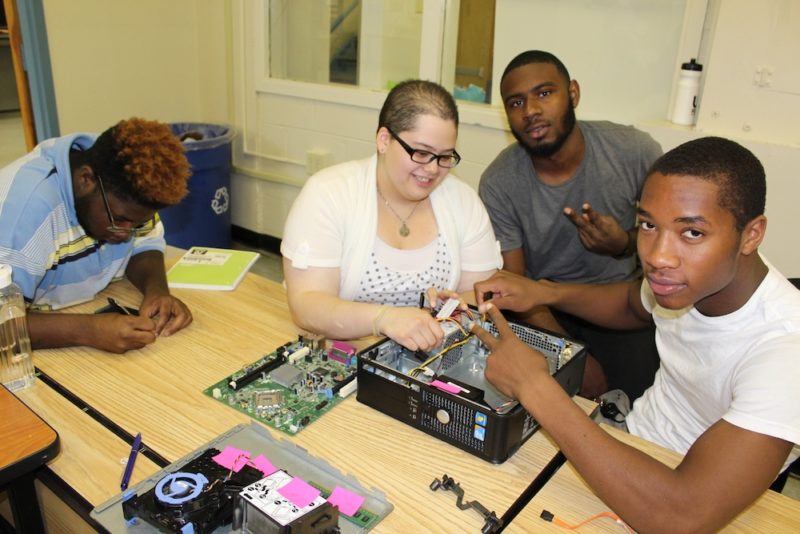Through these hands-on workforce programs, students receive an educational experience and are paid employees of a sponsoring organization while they learn specific skills. Organizations in Philadelphia, for instance, have built apprenticeship opportunities over the last few years, with one local cohort setting a goal of creating 500 new apprenticeship opportunities by 2025 and the apprenticeship network Apprenti set to expand to southeastern Pennsylvania soon.
Fairmount-based Jessie Cunningham, 33, knows all about alternate pathways to a tech career. After graduating from South Philly’s High School for the Creative and Performing Arts, she attended Kutztown University to study education. But after two years, Cunningham dropped out — partially because she didn’t think the format of college was the right learning environment for her.
When she got back to Philadelphia, she applied for the 20-year-old Urban Technology Project’s (UTP) Digital Service Fellows pre-apprenticeship program, which is hosted with AmeriCorps. After completing that, she went on to UTP’s Computer Support Specialist apprenticeship program, where she provided tech support and tech mentorship in the School District of Philadelphia. Cunningham then became a project manager and later director of operations at software development agency Jarvus Innovations.
Working in software development burnt her out, she said. She wanted to pursue a career path that gave back to the community. So she returned to UTP as a project manager. Cunningham has since worked her way up to being the assistant director of IT apprenticeships for the School District of Philadelphia.
Now, the 2023 Technical.ly Awards’ Culture Builder of the Year winner in Philly aims to support apprentices in their careers the same way she was supported after leaving college.
In this edition of Technical.ly’s How I Got Here series, she reflects on the lessons she’s learned and why she believes apprenticeships are so valuable. This Q&A has been edited for length and clarity.
What excites you about your current role?
The best thing for me is the apprentices — seeing them come in on day one, not necessarily confident, very nervous, like “Can I do this?” and seeing them grow throughout the year or the years that they’re in our program. It’s really meaningful and heartwarming to me, and it makes my job a lot easier and fun to be around.
Even our alumni, keeping up with them on LinkedIn and seeing them go up to these high-power jobs like Comcast or [Children’s Hospital of Philadelphia] and things like that. So that’s probably the most meaningful part of my job.
What challenges do you face in this role?
Just [people not knowing] what apprenticeship is. A lot of people think that it’s just the building trades, but it’s really moving into more nontraditional careers and occupations. So that’s a big hurdle as we’re talking to potential employers to get them on, because [UTP is looking] to expand to other employers besides the school district. So getting in the door to talk to employers, but also pitching them on apprenticeships and like, investing in their talent.

UTP at work. (Courtesy Urban Technology Project)
How does your personal experience going through an apprenticeship program influence your work?
I think that I have a very unique background in that sense, where I can kind of walk both lines and kind of see what my experience was and see how we could improve that for our current apprentices. But [I have] institutional knowledge as well, because a lot of our current staff are newer, so I have the experience as an apprentice myself, and then also being on the team since 2016.
When I was in the apprenticeship program, obviously, I was more interested in other pathways besides general IT support. So coming back to UTP, one of the things that I really wanted to accomplish was branching out into other occupations and kind of expanding our offerings for people also who are not interested in IT support. And I’m actually really excited to say that a couple of years ago, we launched a software developer apprenticeship.
We’re exploring other occupations that we can branch out to. So I think that’s probably one of the major things that I took away from my apprenticeship that I wanted to bring as a staff member.
Why did you want to work in tech? Why is the industry interesting to you?
When I was in high school, I joined our tech team, [which] was a period that we had on our roster, and we would go out and fix the computers for the teachers or the printers and things like that. So I always had an interest. My dad was in the tech field as well, so I think that kind of inspired me as well.
It was really cool when I found out about the Urban Technology Project because it kind of married two of my interests, which is education and tech, in a really unique way.
What advice would you give to someone who wants to follow a similar career pathway?
Some of the advice that I’m always giving out to our apprentices is to take full advantage of the apprenticeship — tap into the network of alumni or partners that we have, jump at opportunities that you might not think you’re necessarily interested in. I didn’t have an interest in coding or software development at all, but I kind of just was like, “I’m here to learn, so I’ll learn.” It actually ended up interesting me and led to, you know, five years in the software development industry.
The point of an apprenticeship is to kind of dip your toes into the various possibilities. So I find that most of the apprentices who do take full advantage of, you know, the certifications, the network, the partners, the mentorship, they end up doing really well in their careers.
Why is it important to have access to apprenticeship programs in Philadelphia (and elsewhere)?
I think it’s really important because a lot of the time when we’re talking to young people, particularly in high school, the messaging has always been that college is the only choice if you want to have life-sustaining wages and not [need] to work really hard to make ends meet. “You have to go to college, it’s the only option for you.” And that was the messaging that I received, at least when I was in high school.
And so I think by these apprenticeship programs being more prevalent, we’re kind of moving away from that language and letting young people explore other learning opportunities. … I found out that college wasn’t for me because I just didn’t learn in that format. But it doesn’t mean that I’m not capable of learning and getting those skills to do that occupation.
What goals do you have for your career?
I definitely want to stay in the apprenticeship sector. I actually just launched a new blog called The Apprenticeship Lady, where I kind of talk about my experience and then also apprenticeship in general and strategies and shortcomings that we can overcome and things like that. So I’d like to get more into that kind of work of advocating for more apprenticeships as well. I really love the work that I do with UTP, but also at a higher level, I see myself moving toward that direction.
Sarah Huffman is a 2022-2024 corps member for Report for America, an initiative of The Groundtruth Project that pairs young journalists with local newsrooms. This position is supported by the Lenfest Institute for Journalism.
This is How I Got Here, a series where we chart the career journeys of technologists. Want to tell your story? Get in touch.
Before you go...
Please consider supporting Technical.ly to keep our independent journalism strong. Unlike most business-focused media outlets, we don’t have a paywall. Instead, we count on your personal and organizational support.
3 ways to support our work:- Contribute to the Journalism Fund. Charitable giving ensures our information remains free and accessible for residents to discover workforce programs and entrepreneurship pathways. This includes philanthropic grants and individual tax-deductible donations from readers like you.
- Use our Preferred Partners. Our directory of vetted providers offers high-quality recommendations for services our readers need, and each referral supports our journalism.
- Use our services. If you need entrepreneurs and tech leaders to buy your services, are seeking technologists to hire or want more professionals to know about your ecosystem, Technical.ly has the biggest and most engaged audience in the mid-Atlantic. We help companies tell their stories and answer big questions to meet and serve our community.
Join our growing Slack community
Join 5,000 tech professionals and entrepreneurs in our community Slack today!

The person charged in the UnitedHealthcare CEO shooting had a ton of tech connections

From rejection to innovation: How I built a tool to beat AI hiring algorithms at their own game

Where are the country’s most vibrant tech and startup communities?




